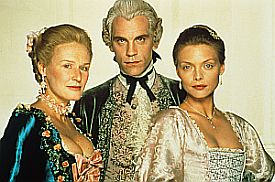 I made a disturbing discovery this weekend. My teenage self was an unreliable narrator. How else to explain how I’d convinced myself for years, since first seeing the film on VHS, that Dangerous Liaisons (1988) is a story well-told? Was it the same misguided taste that led me to believe that Ponderosa Steakhouse was a place to get a superb meal?
I made a disturbing discovery this weekend. My teenage self was an unreliable narrator. How else to explain how I’d convinced myself for years, since first seeing the film on VHS, that Dangerous Liaisons (1988) is a story well-told? Was it the same misguided taste that led me to believe that Ponderosa Steakhouse was a place to get a superb meal?
My memory of this film is of a breathless, tightly-wound drama full of sex and intrigue acted by amazing thespians (Glenn Close, John Malkovich, Michelle Pfeiffer)Â in gorgeous period costumes. Clearly, my high school self was blown away. (It didn’t take much.)
But the cold (adult) reality? A horribly written mess with comical casting. The official summary of the film is, “Rich and bored aristocrats in Rococo France play high-stakes games of passion and betrayal.” My summary would be more along the lines of, “Rich and bored aristocrats try to keep themselves busy and, in so doing, change their motivation once every day or so, so often, in fact, that the viewer gets lost and bored and starts to concentrate on John Malcovich’s teeth and why they were not fixed if he was going to pursue a life in the movies.”
Dangerous Liaisons was first a novel of the same name, except in French. Then it became a play of the same name except in French. I am not familiar with the first two versions but I will hold out hope that they made sense in a way that the film version did not.
The movie starts with Marquise de Merteuil (Glenn Close) asking her “friend with benefits” Valmont (Malkovich) to seduce Cecile (Uma Thurman) because Cecile is going to marry a man who once humiliated or upset the Marquise. If the Marquise were going to have her own hip hop album, it would be called “Don’t Fuck With The Marquise.”
The point of this weird revenge, (in case you were just wondering, “What is the point?”) is to make sure that the guy ends up with damaged goods and is then utterly humiliated to be stuck with Uma Thurman as his wife. Utter humiliation!
Valmont says no to this plan because it would be too easy (too easy for John Malkovich to seduce Uma Thurman!); he has his own dangerous liaison planned with a pious woman, Madame de Tourvel (Michelle Pheiffer) because she is a Good Person and will likely resist him and nothing could possibly make him more happy than to degrade a Good Person. If a Cannon Sure Shot had been readily available in the 1700s, he would take a photo of her face mid-coitus for the Money Shot that would then be sent around via letter to all the great houses of France.
As I mentioned, the Marquise and Valmont had their own thing going in the past. It is never clear what broke it up but it seems likely that two sexy motherfuckers like them just couldn’t stay together. However, of course Valmont is not opposed to another hot night. And, despite her Ms. Cool Cucumber demeanor, the Marquise wants it too. However, rather than just going upstairs or into the Marquise’s secret room and having sex, it gets arranged that if Valmont can indeed seduce the church-going Madame and provide proof in writing, then he gets to sleep with the Marquise again.
Did I mention that these aristocrats are super bored?
Let me just insert here, before we get into more liaisons, that John Malkovich, while a great actor, is not a sexy guy. At one point in the film he looks up suddenly when he and the Marquise are interrupted in conversation and resembled not so much a hot, 1700s dude who thrills the ladies in bed but one of the rabbits from Watership Down – buck-toothed and slightly cross-eyed, caught by surprise in his rabbit warren.

When the going proves tough with the religious Madame, Valmont says, “What the hell,” and decides to go for it with the young Cecile. He tricks her into providing access to her bedroom (all this goes down at Valmont’s aunt’s house in the country and I can’t say that I’m very impressed with Valmont’s behavior as a house guest).
What follows is a disturbing scene in which, well, Valmont rapes Cecile. The rape is not shown but there are some uncomfortable exchanges, wrestling and then a cutaway to the next day, when Cecile is so upset that her mother calls for the Marquise to come out to the country house and console her.
Console her the Marquise does – by telling her that she can have sex with anyone and everyone and that its fun and natural and that she’ll learn a lot of cool tricks to impress her husband. Somehow this makes the rape OK by Cecile and she instantly warms to the idea and then looks forward to Valmont’s nightly visits. The next time they’re shown in bed together it’s as if they’re dating; watching an old movie in bed together after sex and waiting for a late night pizza delivery. Perhaps they’ll be brunch the next day? The New York Times crossword?
And then, low-and-behold, Valmont also manages to get Madame in the sack. I’m not sure how. The writer wasn’t sure how. He shows them talking a lot and John Malkovich giving his rabbity look (there is a moment when he pops his face over a hedge that is hilarious) and then Madame falls off her pedestal.
Did I mention that she’s married? Apparently, her husband is off somewhere doing something. But he never surfaces at any point, not even when she DIES in a convent. Yeah, spoiler alert and all that.
The issue seems to become that Valmont enjoys his passionate sex with Madame a little bit too much and starts to show some humanity, which pisses the Marquise off. She reneges on her offer of One Hot Night, plus she’s been sleeping with Chevalier Raphael Danceny (Keanu Reeves, whom I’ve failed to mention up until this point because I’d prefer to pretend he wasn’t in the movie and did not act as if he was playing the part of a kind but slightly disinterested delivery boy) who was also Cecile’s lover on the side.
Are you getting all these liaisons? Oh, they are dangerous.
Getting back to the part where Cecile “Learns To Stop Worrying and Love Her Rapist” is that it’s only the tip of the “What’s My Motivation?” iceberg that plagues every character. I’m of the mind that, in the space of a two-hour film, motivation for a main character could maybe change once if the plot called for it. Maybe a character has a life-altering experience and sees that what they wanted before was wrong and they have to amend their ways or pursue another path. But all the characters changing their motivation from scene to scene makes one feel as if one is watching a very expensively-filmed rough draft.
Let’s take Valmont, for example.
Motivation #1: To sleep with Madame, the religious chick, for sport and to get One Hot Night with the Marquise.
Motivation # 2: To sleep with young Cecile and ruin her because he is bored.
Motivation #3: Back to Madame, because he sees an opening.
Motivation #4: Love, true love and passion, with Madame, the freaky religious chick.
Motivation #5: Well, still up for that One Hot Night… And jealous of Keanu Reeves for gettin’ lovin’ from the Marquise. Break up with Madame in a very disturbing and badly acted scene. But then… rebuffed by the Marquise. In an about face of her own, the Marquise decides she’s much too pissed off and jealous to sleep with Valmont.
Motivation #6: True, true love with Madame has, alas, slipped away for no sex reward! Alas… Valmont decides to die rather than live without true love. He goes from having no human emotions or empathy to being so overwrought and passionate that he pushes Keanu’s sword deeper into himself while they are in a duel over… I think Cecile and her lost honor. That two of her lovers are fighting over her honor and not her intended husband does not seem odd to anyone involved. Those whacky 18th century aristocrats! Rococo-coco-coco-ooooooooo!
Final Motivation: To be a dead guy. Oh, and to ruin the Marquise by sharing her letters with everyone so that they can boo her when she shows up for the opera and retreat in disgrace.
Yes, she is booed at the opera and goes home to rub her make-up off her face except instead of removing it she smears it all over in a Fanny Farmer-esque moment of insanity. I think the Marquise learned her lesson about liaisons of the dangerous sort.